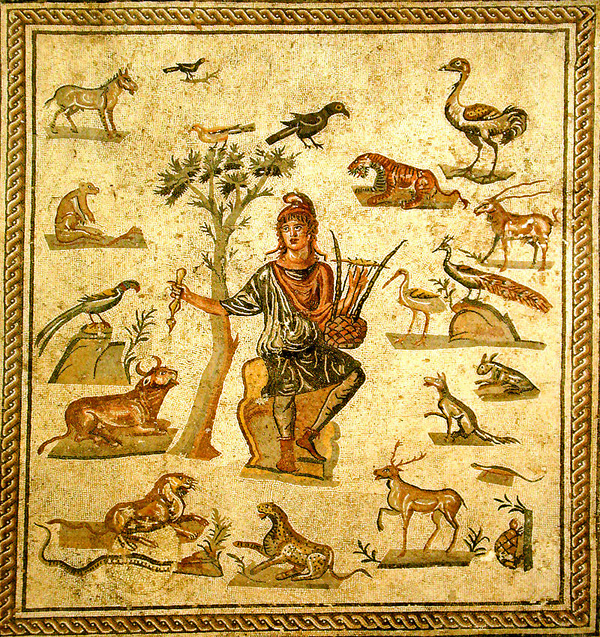Orpheus 3361
Orpheus was a noted singer and musician, son of the muse Calliope, whose songs were so beautiful that he could charm any living thing, even the very stones of the earth. Orpheus learned his craft at the hands of Apollo, god of music, who had been a suitor of his aunt, the muse Thalia, and recognized the boy’s talent, giving him a golden lyre and instructing him in its use. Orpheus’ mother was the muse of epic poetry, and taught him the art of lyrics.
Orpheus’ most famous adventure was his trip to the underworld to retrieve his lost love Eurydice, where he used his musical charms in stirring the heart of Hades, god of the dead, to permit her release. However, Orpheus’ was ultimately unsuccessful in this endeavor, due to a lack of faith [see the entry on asteroid Eurydice for further details].
Orpheus was also a member of the famed Argonauts, heroes who travelled with Jason to find the Golden Fleece. Orpheus’ major contribution to that effort was his assistance in evading the Sirens, beautiful sea maidens whose songs were so lovely they enticed sailors to their deaths on the rocks where the Sirens sang. Orpheus played his lyre so loudly that he drowned out the Siren songs, and Jason and the Argonauts sailed safely past them.
Orpheus was also a noted prophet, and established both the Orphic Mysteries and an oracular shrine. Like the Eleusinian Mysteries, the Orphic Mysteries were based in esoteric knowledge gained during the hero’s journey to the underworld, and promised advantage in the afterlife.
Orpheus’ death was a tragic one. After the loss of Eurydice, Orpheus eschewed the company of women, despite the lure of his song, which caused all who heard it to desire him. Instead, Orpheus became enamored of young boys, one of the first of the ancient Greeks to engage in pederasty. Some of the Maenads, wild women who followed Dionysos in his revels, became so offended by his rejection of them that they threw sticks and stones at him, but even the branches and rocks refused to hit him. Enraged, the Maenads set upon Orpheus and tore him to pieces. But Orpheus’ head, thrown into a river, continued to sing dirges and mournful songs, as it floated out to sea with his lyre. Eventually the head washed ashore in Lesbos, where a shrine was built in his honor, and an oracle prophesied in his name. The lyre was set in the heavens as the constellation Lyra.
Astrologically, Orpheus represents musical aptitude, prophetic skill, the ability to persuade or entreat others successfully, and contact with the dead or dying. Grief is a common theme for those with a strongly-placed Orpheus, both grief for those lost to death, but also for lost circumstances, or the elusive “what might have been”, the situations which never fully developed due to countervailing conditions or lack of focus in gaining them.


2 Trackbacks
[…] / Jupiter conjunct Damocles / Jupiter quintile Uranus / Venus + Mercury + Asbolus square Neptune + Orpheus + Pallas / Venus trine Saturn / Venus bi-quintile Pluto / Mercury semi-square Uranus / Mercury […]
[…] 1) Alex Miller: Orpheus 3361 2) Martha Lang-Wescott: Basic Resources 3) Kirsti Melto: Full Moon in Cancer – January 11, […]